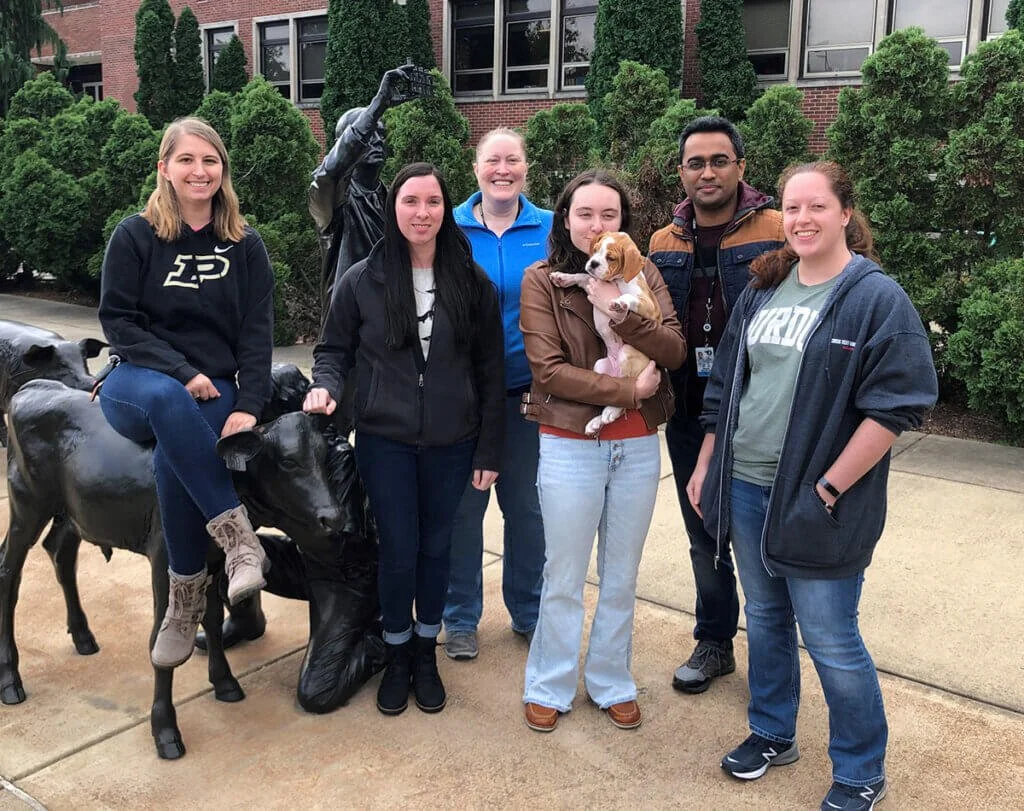Hackathon challenges students to develop innovative solutions in 36 hours
By 1:00 a.m. on the second night, the gym is tense with energy. At 27 hours in, a scheduled late-night snack pro-vides enough of a boost to drive participants through the final hours of Boilermake 5. The student-run hackathon attracted more than 2,000 applicants this year for about 500 randomly selected spots. Surveying the room, Boilermake cofounder Brittany Vacchiano (S’14) was amazed at how much the event has grown over the past three years.
“It’s crazy. I feel like such a proud parent,” says Vacchiano, a consultant at Clarity Partners based in Chicago. “The first year, it was pretty bare bones. We spent a lot of time figuring out how to work with the University to start some-thing. Convincing administrators it was worth it was the first challenge.”
For students interested in rapidly expanding their knowledge in tech, hackathons offer a fun, collaborative environment to produce a hardware or software product within a weekend. Teams can opt to take on a challenge presented by a sponsoring company, often including a cash prize, or to build something of their own devices.
Challenges can range from best travel app to analyzing large data sets. As a sponsoring company, Clarity Partners provided the hackers with fictitious dispatch data from the Chicago Police Department to analyze it for trends. The sponsors select winning teams based on outcomes. That can be the best use of their technology, the most impressive outcome, or just the coolest thing they’ve seen all weekend.
As director of Boilermake 5, Jess Jiang had one goal — for participants to be happy, whether that’s learning some-thing new, making a friend, building teamwork skills, or forging a connection with a sponsor. Though she describes a hackathon as “tech on steroids,” Jiang says Boilermake has transcended beyond the intense competition focus and is more about community and experience. The entire week-end is paid for through sponsorships. Participants have access to sleeping rooms and shower facilities, and all meals and snacks are provided.
Students travel from all over the country to participate. Purdue arranges for buses to transport students from target schools such as University of Illinois, University of Michigan, and Illinois Institute of Technology. Although Boiler-make is open to all majors, most participants are studying computer science or a related field. Vacchiano’s involvement in the hackathon culture began during her time on the Computer Science Undergraduate Student Board.
“I attended hackathons at Michigan and Pennsylvania. They were the originators,” she says. “It was a great opportunity to work on a project, win prizes, and learn tech. But I always noticed there weren’t a lot of girls. It can be really intimidating. They think they’re not good enough to come to these events.”
Jiang can relate. The junior in electrical and computer engineering from San Jose, California, confessed an unhealthy obsession for hackathons in high school. By her senior year, she was attending a hackathon almost every weekend.
“I completely understand why women are intimidated about coming to hackathons,” says Jiang. “I remember my first hackathon, I was nearly going to throw up. My friends had to drag me to the venue. But then I felt a lot better about it. I learned a lot and made the most out of 36 hours.”
As a woman working in tech, Vacchiano is motivated to inspire more girls to study coding and not to view it as an inaccessible career choice. “It’s definitely intimidating,” she says. “I was one of 40 girls majoring in computer science. I felt like there was no one I could relate to in my classes.”
This fall, the Department of Computer Science announced that 21 percent of its first-year majors are now women, com-pared to 13 percent in 2015. Female faculty members have also doubled since 2012. Vacchiano is doing her part to continue the trend. In addition to supporting more women participating in hackathons like Boilermake, she also leads a Girls Who Code club at a high school in Chicago and is in the process of starting a girls coding club at the Cook County Juvenile Detention Center.
“We need more girls in coding. This needs to be more diverse,” she says. “I want these hackathons to help girls understand that they are good enough to continue down these engineering and computer science paths. The good stuff is right around the corner.”
This story appeared in the Winter 2017 issue of Purdue Alumnus magazine.
Photos by Kat Braz.












